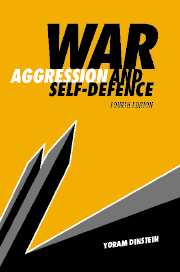Book contents
- Frontmatter
- Contents
- Introduction to the fourth edition
- From the introduction to the first edition
- Table of cases
- Table of treaties
- Table of security council and general assembly resolutions
- List of abbreviations
- Part I The legal nature of war
- 1 What is war?
- 2 The course of war
- Part II The illegality of war
- Part III Exceptions to the prohibition of the use of inter-state force
- Conclusion
- Index of persons
- Index of subject
1 - What is war?
- Frontmatter
- Contents
- Introduction to the fourth edition
- From the introduction to the first edition
- Table of cases
- Table of treaties
- Table of security council and general assembly resolutions
- List of abbreviations
- Part I The legal nature of war
- 1 What is war?
- 2 The course of war
- Part II The illegality of war
- Part III Exceptions to the prohibition of the use of inter-state force
- Conclusion
- Index of persons
- Index of subject
Summary
The definition of war
The numerous meanings of war
The phrase ‘war’ lends itself to manifold uses. It is necessary, at the outset, to differentiate between ‘war’ as a figure of speech heightening the effect of an oral argument or a news story in the media, and ‘war’ as a legal term of art. In ordinary conversation, political manifestos, press reports or literary publications, ‘war’ may appear to be a flexible expression suitable for an allusion to any serious strife, struggle or campaign. Thus, references are frequently made to ‘war on terrorism’, ‘war against the traffic in narcotic drugs’, ‘class war’ or ‘war of nerves’. As a rule, this is a matter of poetic licence: the metaphor of war merely serves to convey the gravity of the situation. But the metaphor must not be taken literally, lest it create confusion and incongruities derived from the fact that, in legal parlance, the term ‘war’ is invested with a special meaning. A metaphorical ‘war’ may admittedly segue into a real war in the legal sense: this is what happened in 2001 when Taliban-led Afghanistan gave a haven to Al-Qaeda terrorists responsible for the outrage of the 11th of September (9/11) (see infra, Chapter 7, B, (b), (bb)).
In pursuing the legal meaning of war, a distinction must be drawn between what war signifies in the domestic law of this or that State and what it denotes in international law.
- Type
- Chapter
- Information
- War, Aggression and Self-Defence , pp. 3 - 29Publisher: Cambridge University PressPrint publication year: 2005



